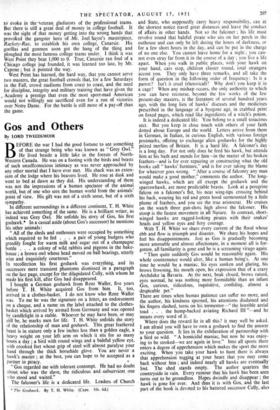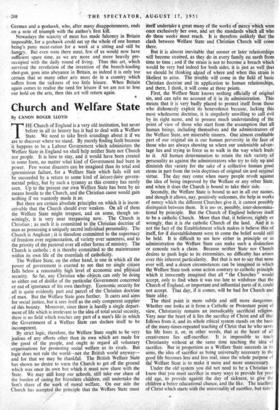Gos and Others
By LORD TWEEDSMUIR
BEFORE the war I had the good fortune to see something of that strange being who was known as " Grey Owl.' He lived beside a little lake in the forests of North- Western Canada. He was on a footing with the birds and beasts of such unselfconscious intimacy as was never approached by any other mortal that I have ever met. His shack was an exten- sion of the lodge where his beavers lived. He rose at dusk and went to bed at dawn as they did. His understanding of them was not the impressions of a human spectator of the animal world, but of one who sees the human world froth the animals' point of view. His gift was not of a sixth sense, but of a sixth sympathy. In different surroundings in a different continent, T. H. White has achieved something of the same. He is a brilliant writer, as indeed was Grey Owl. He unfolds his story. of Gos, his first goshawk.* In a casual aside (about Gos's successor) he mentions his other animals: " All of the sheds and outhouses were occupied by something which required to be fed . . -. a pair of young badgers who greedily fought for warm milk and 'sugar out of a champagne bottle . . . a colony of wild rabbits and pigeons in the bake- house ; a brown owl whose head moved on ball bearings, utterly wise and exquisitely courteous." In recollection his first goshawk was everything, and its successors mere transient phantoms dismissed in a paragraph on the last page, except for the dilapidated Cully, with whom he made his first kill, after Gos had disappeared.
I bought a German goshawk from Renz Waller, five years before T. H. White acquired Gos from him. It, too. arrived in a clothes-basket. I do not know who Renz Waller was. To me he was the signature on a letter an endorsement on a cheque, and a name on the label attached to the clothes- basket which arrived by airmail from Germany and was opened by candlelight in a stable. Whoever he may have been, or may still be, he marks men for lire. T. H. White unfolds the story of the relationship of man and goshawk. This great feathered beast is in stature only a few inches less than a golden eagle, a heavy weight on your left arm on which it sits for so many hours a day ; a bird with round wings and a baleful yellow eye. with crooked feet whose grip of steel will almost paralyse your hand through the thick horsehide glove. You are never a hawk's master ; at the best, you can hope to be accepted as a partner in piracy. " Gos regarded me with tolerant contempt. He had no doubt about who was the slave, the ridiculous and-subservient one who stood and waited."
The falconer's life is a dedicated life. Leaders of Church * The Goshawk. By T. H. White. (Cape. 10s. 6d.) and State, who supposedly carry heavy responsibility, can at the shortest notice travel great distances and leave the conduct of affairs in other hands. Not so the falconer ; his life must revolve round that baleful pirate who sits on her perch in the outhouse and can only be left during the hours of darkness, or for a few short hours in the day, and can be put in the charge of no one else. You cannot leave home for a night ; you can- not even stray far from it in the course of a day ; you live a life apart. When you walk in public places, with your hawk on your hand, cars stop, children cluster round, total strangers accost you. They only have three remarks, and all take the form of question in the following order of frequency : Is it a parrot? Isn't it cruel (rhetorical)? Why don't you keep it in a cage? When any mishap occurs, the only authority to which you can have recourse, beyond the few works of the few present-day masters, is the literature of several hundred years ago, with the long lists of hawks' diseases and the medicines prescribed in the language of a byegone age, in crabbed print on foxed pages, which read like ingredients of a witch's potion.
It is indeed a dedicated life. You belong to a small tenacious sect. But you keep in close touch with others of your faith dotted about Europe and the world. Letters arrive from them in German, in Italian, in curious English, with various foreign postmarks, offering to exchange alien goshawks for the highly prized merlins of Britain. It is a hard life. A falconer's day is a long day. For not only does he feed his hawk, but attends him at his bath and mends for him—in the matter of his broken feathers—and is for ever repairing or constructing what the old books call " hawks' furniture," and is for ever taking the blame 'for whatever goes Wrong. " After a course of falconry any man would make a good mother," comments the author. The long- winged hawks, which are all except the goshawk and the sparrowhawk, are more predictable beasts. Look at a peregrine falcon on a falconer's fist, his neat wing-tips crossing behind his back, wearing his red and green hood surmounted by a little plume of feathers, and you see the true aristocrat. He cruises on the watch three gun-shots high above the falconer. 'His stoop is the fastest movement in all Nature. In contrast, short, winged hawks are ragged-looking pirates with their snakes' heads and yellow eyes and fiery courage.
With T. H. White we share every current of the flood whose ebb and flow is triumph and disaster. We share his hopes and feel his disappointments. Jug as Gos is gradually becoming more amenable and almost affectionate, in a moment all is for- gotten, all familiarity is gone and he is a screaming virago again.
" Then quite suddenly Gos would be reasonable again. His whole countenance would alter, like a human being's. At one time he would be a maniac, his eyes sunken and glaring, his brows frowning, his mouth open, his expression that of a crazy Archduke is Bavaria. At the next, beak closed, brows raised, eyes normal, he was nothing more formidable than an infant Gos, curious, ridiculous, inquisitive, confiding, almost a despicable pet." There are times when human patience can suffer no more, and the author, his kindness spurned, his attentions disdained and his fingers slashed, turns on his tormentor—" the horrible aerial toad . . . the hump-backed aviating Richard HI "—and he means every word of it. Where does the reward lie in all this? it may well be asked. I am afraid you will have to own a goshawk to find the answer to your question. It lies in the exhilaration of partnership with a bird so wild. " A homicidal maniac, but now he was enjoy- ing to be stroked—we are again in love." Into all sports there enters a degree of apprehension which makes the sport the more exciting. When you take your hawk to hunt there is always that apprehension tugging at your heart that you may come back without him ; and indeed nearly all hawks are eventually lost. The shed stands empty. The author quarters the countryside in vain. Every rumour that his hawk has been seen turns out to be groundless. Hopes dwindle and disappear ; the hawk is gone for ever. And thus it is with Gos, and the last part of the book is devoted to his battered successor Cully, also German and a goshawk, who, after many disappointments, ends on a note of triumph with the author's first kill.
Nowadays the scarcity of meat has made falconry in Britain impossible, for a goshawk could eat up the whole of one human being's puny meat-ration for a week at a sitting and still be hungry. But even were there meat, few of us would now have sufficient spare time, as we are more and more heavily pre- occupied with the daily round of living. Thus this art, which survived the revolution of the invention of the breech-loading shot-gun, goes into abeyance in Britain, as indeed it is only too certain that so many other arts must dO in a country which suffers from the sickness of too little leisure. When Britain again comes to realise the need for leisure if we are not to lose our hold on the arts, then this art will return again.































 Previous page
Previous page